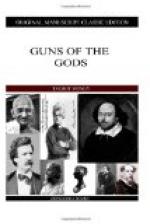“But what are you and the priest and Samson all bargaining about?” demanded Tess.
“The treasure of Sialpore! But I make no bargains! I, who know where the treasure is! Why should I offer to share what is mine? I will have a marriage contract drawn, and you shall be a witness. That treasure is my dowry. Listen! Bubru Singh my father died without a son—the first of all that long line who left no son to follow him. The custom was that he should tell his son, and none else, the secret of the treasure. He hated Gungadhura; and, not knowing which the English would choose for his successor, Gungadhura or another man, he told no one, making only hints to my mother on his death-bed and saying that if I, his daughter, ever developed brains enough to learn the secret of the treasure, then I might also have wit enough to win the throne and all would be well.”
“And you discovered it? How did you discover it?”
“Not I.”
“Who then?”
“Your husband did!”
“My husband? Dick Blaine? But that can’t be true; he never told me; he tells me everything.”
“Perhaps he would have told if he had understood. He hardly understands yet. Only in part—a little.”
“Then how in the world—?”
Yasmini’s golden laugh cut short the question as she rose to her feet with a glance at the westering sun.
“Let us go. Two hours from now we shall cross the border into another state. Two hours after night-fall our journey is ended. Then the last game begins—the last chukker—and I win!”
Tess wished then that they had never halted! The rest had given her muscles time to stiffen, and her nerves the opportunity to learn how tired they were. As the camels rose jerkily and followed their leader in line at the same fast pace as before she grew sick with the agony of aching bones and the utter weariness of motion repeated again and again without varying or ceasing. Every ligament in her body craved only stillness, but the camel’s unaccustomed thrust and sway continued, repeated to infinity, until her nerves grew numb and she was hardly conscious of time, distance, or direction.
Once again there was pursuit, but Tess was hardly conscious of it— hardly realized that shots were fired—clinging to the saddle in the misery of a sickness more weakening and deathly than the sort small boats provide at sea. The sun went down and left her cooler, but not recovered. She knew nothing of boundaries, or of the changing nature of the country-side. It meant nothing to her that they were passing great trees now, and that once they crossed a stream by a wide stone bridge. The only thought that kept drumming in her mind was that Dick, the ever dependable, had misinformed her. She had “fetched it up”—a dozen times. True to his instruction, she had “carried on.” But it did not pass! She felt more sick, more agonized, more weary every minute.




